Research Expedition Brings Antarctica’s Extremes to Students
Published December 16, 2024
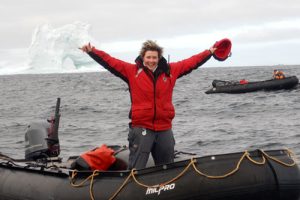
It may seem counterintuitive that microbiologist Emanuele Kuhn, who grew up in the humidity of southern Brazil and now lives in San Paolo – one of the world’s most populous cities- identifies as a psychrophile, an organism that loves the cold. There is nothing frigid or icy about her. To the contrary, Kuhn, a former guest speaker and a now an adjunct lecturer in the Johns Hopkins University MS in Environmental Sciences and Policy program, radiates warmth and affability and a fiery passion intense enough to contribute to the melting of the polar regions that she has dedicated her life to protecting.
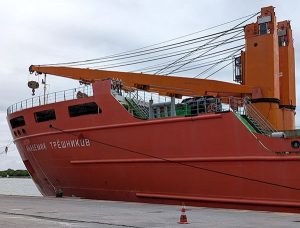
Kuhn, who is currently co-teaching a course on atmospheric and ocean processes with Program Director Cassie Hansen, is bringing her students along with her on her 16th trip to Antarctica, the world’s fifth largest and southernmost continent. As one of 61 researchers, including 26 fellow Brazilians, Kuhn boarded a Russian ice-breaking vessel, the Akademik Tryoshnikov, in southern Brazil on November 22. The two-month research expedition is part of a BRICS international collaboration that will circumnavigate Antarctica. With a total of 140 researchers in tow, the vessel will be traveling clockwise along the edge of the sea ice of the continent, making stops at eight Russian and Chinese research stations around the coast of Antarctica via helicopter access from the ship. Kuhn’s students will be tracking her progress thanks to a navigational app. If connectivity permits, she may be able to provide a first-hand glimpse of her research and her maiden-voyage impressions of life on the vessel that will include, of course, Brazilian coffee and Russian vodka, and meals of pork and potatoes.
Kuhn and her colleagues will be collecting samples from the water and air to gauge the degree of glacial melting and other adverse changes to the continent. Since it is summer in Antarctica, the group will have 24 hours of daylight to complete their work and a mini laboratory on the ship to gain a better understanding of changes that are happening with global warming, climate change, and ocean acidification. The region remains of tremendous importance to geographers, meteorologists, climatologists, marine biologists, astronomers, and astrobiologists, among others, because of its unique environment that offers an indication of broader global processes.
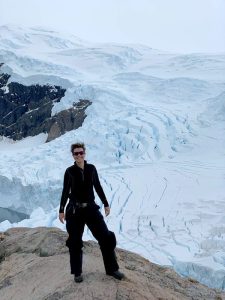 “This expedition is unique because we will be traveling as close to the edge of the continent as possible, which will allow us to record and study module changes in sea ice and ice shelves,” Kuhn said of her first time on the Russian vessel. “It is impossible to do this work in the winter because the continent almost doubles in size when sea ice forms around the continent in the winter months. After my first trip to Antarctica in 2005, I knew that this was where I belong. Antarctica is home to me, and it has become my world. From then until today and for the rest of my life, Antarctica will be the subject of my life. My purpose now is to tell people that human beings are the ones who are making all this happen. Climatologists and glaciologists have measured it. We have higher levels of carbon dioxide never before registered in the atmosphere. And because the ocean absorbs most of the extra heat and carbon dioxide on the planet, the carbon dioxide in the water makes the ocean acidic. We are losing kilometers and kilometers of coral reefs, especially in Australia. Glacier melting is going to be the major reason for our rising sea levels. We have lost the connection between human beings and nature. It is my mission and calling in this life to play my part and to bring people to an understanding that is all the result of human impact. My slogan in life has become ‘We don’t own the planet. We share it.’ We are changing our planet and these fragile environments, and not for the better.”
“This expedition is unique because we will be traveling as close to the edge of the continent as possible, which will allow us to record and study module changes in sea ice and ice shelves,” Kuhn said of her first time on the Russian vessel. “It is impossible to do this work in the winter because the continent almost doubles in size when sea ice forms around the continent in the winter months. After my first trip to Antarctica in 2005, I knew that this was where I belong. Antarctica is home to me, and it has become my world. From then until today and for the rest of my life, Antarctica will be the subject of my life. My purpose now is to tell people that human beings are the ones who are making all this happen. Climatologists and glaciologists have measured it. We have higher levels of carbon dioxide never before registered in the atmosphere. And because the ocean absorbs most of the extra heat and carbon dioxide on the planet, the carbon dioxide in the water makes the ocean acidic. We are losing kilometers and kilometers of coral reefs, especially in Australia. Glacier melting is going to be the major reason for our rising sea levels. We have lost the connection between human beings and nature. It is my mission and calling in this life to play my part and to bring people to an understanding that is all the result of human impact. My slogan in life has become ‘We don’t own the planet. We share it.’ We are changing our planet and these fragile environments, and not for the better.”
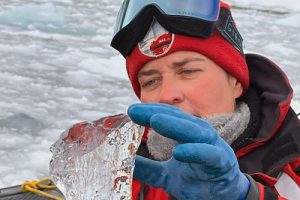 This is why Kuhn, who received her undergraduate and graduate degrees in molecular and cellular biology and biotechnology in Brazil and her PhD in biochemistry and molecular biology at the University of Nevada, Reno, as a Fulbright Scholarship recipient, was so excited to join the staff at Johns Hopkins.
This is why Kuhn, who received her undergraduate and graduate degrees in molecular and cellular biology and biotechnology in Brazil and her PhD in biochemistry and molecular biology at the University of Nevada, Reno, as a Fulbright Scholarship recipient, was so excited to join the staff at Johns Hopkins.
“Johns Hopkins, for me, is a dream come true,” Kuhn said. “I really enjoy co-teaching with Professor Hansen, and I really value the work that the University does, the way we instruct our students and connect them from all places in the planet. I always thank my Johns Hopkins students because I learn so much from them. They bring so much to our discussion about things I did not know.”
Kuhn and Hansen have turned their sights into designing a new course on climate change in the polar regions to include a field study component, first in the Artic and eventually in Antarctica.
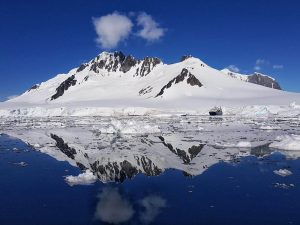
“I am so grateful for the opportunity that Johns Hopkins has given me to build something that is very important to me and that fits well within the scope of the University,” she said. “I really enjoy what JHU does to advance knowledge and teaching all over the world. My dream come true will be to bring the ESP students to the field and help Johns Hopkins develop this amazing experience of field work and policy change that is needed for the way people see the planet, particularly in the polar regions, and feel connected to it. My goal with Johns Hopkins is to empower my students to be policy makers and change agents.”
Kuhn points to the preservation of the International Antarctic Treaty as one such policy that future generations will need to safeguard for Antarctica to remain as the final frontier for peaceful exploration and research, without human habitation and extraction.
“The biggest misconception about Antarctica is that there is nothing there,” said Kuhn, who credits her parents for teaching her to observe and feel nature. “Though no one country owns Antarctica, the continent has diamonds, natural gas, oil, and everything else that human beings think they need to exist. I am really concerned that future generations understand the importance of protecting the integrity of this Treaty and the resources of this continent.”
In addition to the important research that Kuhn will be conducting in the coming months, she is anxious to give her students a first-hand look at the amazing marine life, the fin, humpback, and blue whales, the penguins, and seabirds, that she sees regularly in Antarctica, as well as a feel for its vast scope and size.
“It is so amazing and beautiful to be in the wilderness in the absence of human beings, and I hope that my students will soon be able to personally experience this phenomenon,” she said. “Knowledge and learning are the major things that I can take away from my life, and I am grateful to be able to share my 18 years of academic research related to life in extreme environments, and my study of unicellular life, that first brought me to Antarctica. But I am also embracing my conservation role and working to refute the biggest misconception about Antarctica, and that it is that it is just a frozen tundra of ice. Life is so simple and beautiful and amazing there, and we have so much to learn from it. If I could live there forever, I would.”
Interested in pursuing a graduate degree at Johns Hopkins University?
Request information to learn more or apply here.